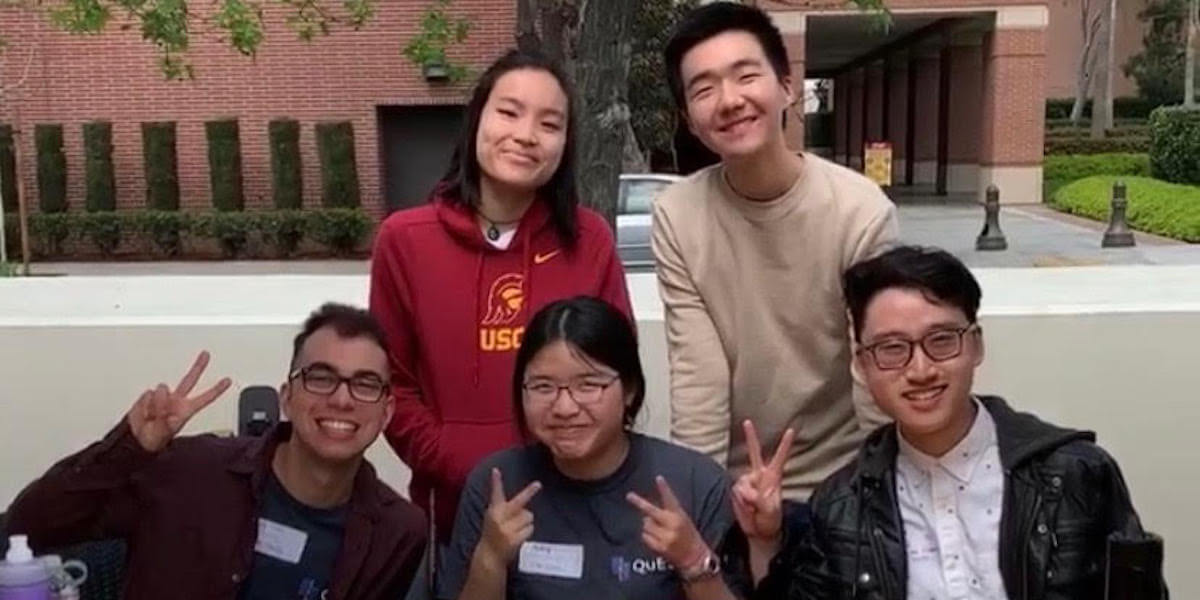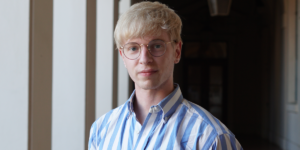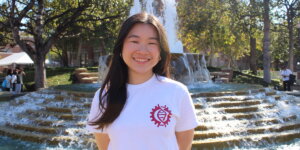
QuEST e-board members Abby Nguyen, Sulley Park, Nick Nuccio, Mady Tung, and Timothy Wang at the USC involvement fair. (Photo/Courtesy of Emma Morrissey)
When Bailey Leavy got accepted to USC Viterbi, he was just like any other admit. He studied hard, got good grades and immediately made a LinkedIn page.
But it took time for Leavy to find true acceptance on campus. “I didn’t come out in high school,” said Leavy, a chemical engineering senior with a polymer and materials science emphasis. “It wasn’t because I didn’t feel comfortable with myself, but it was something I could continue to put on the backburner.”
That is, until his Freshman Academy coach introduced him to Queers in Engineering, Science, and Technology, or QuEST – a USC Viterbi student-led organization that provides professional, social and personal support for students who identify as queer in science, technology, engineering and mathematics (STEM) fields at USC.
Founded in 2014 by USC alumna Makana Krulce, B.S. CE ‘15, QuEST was established as an affiliate of Out in STEM (oSTEM), a national conference for LGBTQ+ undergraduates in science and technology, and as part of the Queer and Ally Student Assembly at USC. QuEST averages a hundred or so members each school year.
Maria Bacci, B.S. CE ’18, presided over QuEST after Krulce, followed by Leavy and his co-president, Emma Morrissey, a mechanical engineering senior.
QuEST encourages professional development by hosting recruiters on campus and diversity talks. Corporate affiliates include Boeing, Northrop Grumman, Bloomberg, Disney, and – the newest addition – Google.
It’s a social club, too, where LGBTQ+ students bond over “quoffee,” “GAYme” nights, and screenings of “Ru Paul’s Drag Race.”
“The part that has been most helpful to me,” Leavy said, “is the social aspect and the community.”
The acronym LGBTQ+ represents the myriad of defined sexual identities: lesbian, gay, bisexual, transgender, and queer+.
What is queer? According to the Stonewall Foundation’s Glossary of Terms, it is an umbrella term used to describe those who reject specific labels for their romantic or sexual orientation, and/or gender identity.
For example, someone might be attracted to both men and women, but may not want to specifically identify as bisexual, but rather as queer in general. The plus (+) refers to other identities under the queer umbrella, such as asexual, polyamorous, inter-sex and two-spirited.
QuEST sponsors students each year to attend the national oSTEM conference. It is a space for students and employers to discuss the realities of being queer in the workplace, from finding allies in managers to networking with LGBTQ+ professionals. Some even leave with jobs.
Recently, alumni have gone on to work for companies like Accenture or Microsoft, who then come back to campus for mock interviews, resume reviews and informational sessions.
Officially, QuEST recruits its members at the USC Viterbi and campus-wide club fairs held each semester. Naturally, those who sign up then tell their friends.
QuEST welcomes students from all identities, including allies, to join the organization.
The major goal this year is to increase the organization’s awareness. “We are trying to be more visible on campus, so people know we exist,” Leavy said.
The club has 14 elected positions for the executive board, committee leadership opportunities, and upperclassmen serving as senior advisors. Freshmen and sophomores can test leadership responsibilities through the inner mentorship program.
“We are trying to set up a formal [mentorship program] for all members,” Leavey said. “To foster a more personal experience.”
Outside of USC, the group makes a local impact on homeless LGBTQ+ youth.
“The yearly fundraiser event is to benefit the homeless LGBTQ+ youth community.” QuEst co-president Morrissey said of her favorite QuEST activity. “That’s one thing that’s really important to me, personally, and a lot of members of the organization.”
It’s estimated queer youth constitute 40 percent of all unaccompanied homeless youth, according to the 2018 State Index on Youth Homelessness.
Last fall, the group donated $400 to the LA LGBT Center selling Krispy Kreme donuts outside of Leavey Library. This year, QuEST hopes to plan events or volunteer with the center.
Queer representation and support systems especially matter to university students in STEM, experts said. A 2018 article published in Science Advances reported that sexual-minority undergraduate men are 7 percent less likely than their heterosexual peers to continue STEM over the course of a four-year degree.
QuEST makes a positive impact by giving queer engineers on campus a place to call home.
“Before I joined QuEST, I felt kind of disconnected from me being gay,” Leavy said. “When I came to college, I wasn’t sure if I was going to be out.”
Leavy, whose hometown is Mokena, Illinois, a small village “an hour southwest of Chicago,” understands coming out isn’t easy. “At first, I was kind of reluctant,” he said about joining QuEST three years ago.
Leavy has since come to embrace both parts his of identity. “QuEST really allowed me to become more in touch with both the engineering community and the LGBT community,” he said.
Published on September 19th, 2019
Last updated on September 19th, 2019









